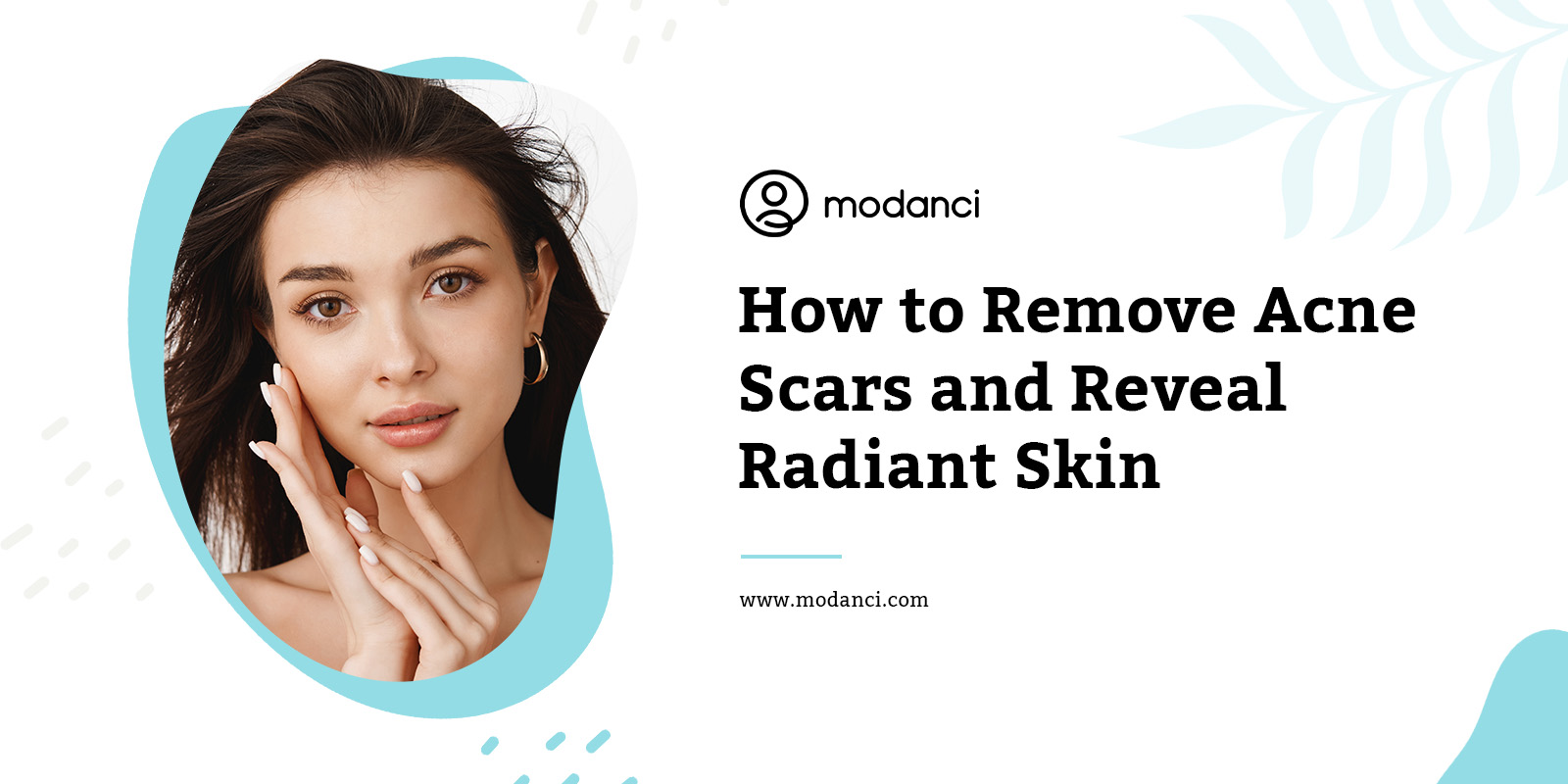Dealing with stubborn acne scars that seem to resist popular remedies? Don’t worry; tackling those scars early on is key to preventing them from becoming a long-term nuisance.
Acne scars are those pesky marks that stick around after your acne has cleared up. They’re pretty common, affecting about 80% of people with acne. You might notice them as brown or red spots, raised bumps, or little indentations on your skin. If acne sticks around for too long, it can often lead to scarring, so treating acne as soon as possible is crucial to avoid those lingering marks.
But fortunately, natural ingredients and homemade remedies can help you fight your acne scars. Keep reading to learn about preventive measures for acne scars and discover natural home remedies to bid those marks farewell and reveal your skin’s natural radiance.
What are Acne Scars?
So, what’s behind those acne scars? According to Ayurveda, imbalances in the doshas can cause skin discolouration and deformities by letting those pesky ama toxins accumulate. Luckily, Ayurvedic texts have a three-step treatment called “Vrana Vastu” to tackle acne scars head-on. It involves purifying the skin, promoting tissue development and remodelling, and rejuvenating those hair follicles to restore your skin’s natural glory.
Now, let’s talk about how acne scars actually form. When a hair follicle gets clogged with sebum, dirt, and dead skin cells, it’s like a recipe for trouble. If bacteria join the party and get trapped in those blocked pores, it leads to inflamed acne in the form of pustules, papules, or nodules.
But what factors make acne scars more likely to show up? Well, let’s break it down:
- Inflammatory Acne Conditions: The deeper and more severe the inflammation, the higher the chances of ending up with scars. Those nasty cystic and nodular acne types can cause deeper tissue damage and increase the risk of scarring.
- Delay in Treatment: Quick action is key! Treating acne promptly can prevent prolonged inflammation, which is a major culprit behind acne scars.
- Popping Pimples: I know it’s tempting, but resist the urge to squeeze or pop those zits. It can worsen things by rupturing the follicle wall, spreading the infection, and increasing inflammation. That’s a surefire way to invite acne scars to the party.
- Hormonal Imbalances: Hormones can wreak havoc on our skin. Fluctuations during periods, pregnancy, and menopause can lead to severe inflammatory acne, making those scars more likely to show up.
- Genetic Influence: If acne scars run in your family, you might be more prone to them. Blame it on those genes!
- Smoking: Here’s another reason to kick that smoking habit to the curb. Smokers are more susceptible to acne scars because the harmful substances in tobacco smoke mess with the skin’s healing and collagen production.
Knowing the factors contributing to acne scars can help us take preventive measures and keep our skin looking its best. So, let’s show those scars who’s boss and keep our skin happy and healthy!
Care for your Skin
To tackle those pesky acne scars, a consistent and comprehensive skincare routine is key. But why stop there? By integrating Ayurvedic principles into your regimen, you can supercharge your efforts. Ayurveda believes in personalised care, considering your unique body constitution and imbalances. This holistic approach considers factors like diet, lifestyle, and specific herbs or treatments to effectively address acne scars.
So, prepare to pamper your skin with a mindful skincare routine infused with Ayurvedic practices. Nurture and revitalise your skin, promoting healing, reducing inflammation, and gradually fading those acne scars. It’s time to embrace a holistic approach to skincare and bid farewell to those unwanted reminders on your skin.
Sun Protection
Defend your skin against the sun’s harmful rays, which can worsen the appearance of acne scars by stimulating pigment production. When you’re outdoors, shield your skin by applying sunscreen with an SPF of 30 or higher, wearing a wide-brimmed hat for extra shade, and seeking sheltered areas whenever possible.
Gentle Skincare
Choose gentle skincare products to avoid aggravating acne scars and skin discolourations. Harsh methods can irritate the skin and make things worse. Listen to your skin and discontinue using any product that causes adverse reactions. Stick to gentle facial cleansers, makeup removers, moisturisers, and scrubs that soothe rather than inflame your skin.
Moisturize
Apply moisturiser to damp or wet skin for effective penetration. For extra hydration, mix your favourite facial cream with Aloe Vera Gel, which acts as a natural humectant, drawing moisture from the air and leaving your skin well-hydrated.
Exfoliation
Incorporate regular exfoliation into your skincare routine to remove dead skin cells and reveal fresh, soft skin. Exfoliating helps speed up the fading process of acne scars. Use a facial scrub designed for sensitive skin or a soft washcloth with warm water, gently moving it in circular motions across your face. Exfoliate at least once a week, but no more than once a day. If your skin is dry, consider exfoliating 3 to 4 times a week to avoid excessive dryness.
Balanced Diet
Maintain a well-hydrated and balanced diet to support your body’s optimal functioning and aid in skin healing. Drinking plenty of water flushes out toxins and keeps your skin plump. Include skin-friendly vitamins like A, C, and E, which can be found in vegetables like broccoli, spinach, carrots, oranges, tomatoes, sweet potatoes, and avocados. Minimise consumption of greasy, fatty, and starchy foods that aren’t beneficial for your skin. Remember, a healthy diet won’t magically erase scars, but it promotes overall skin health.
Natural Home Remedies
1. Orange peel Cleanser
Orange peel is a fantastic natural cleanser for your skin. Packed with vitamin C, it stimulates collagen production and repairs skin cells, reducing acne scars and blemishes. It’s especially beneficial for oily skin as it removes excess sebum and provides natural hydration. To use, grind dried orange peel into a powder and mix half a teaspoon with one teaspoon of milk, coconut milk, or yoghurt. Gently massage onto your skin, leave it for 10-15 minutes, then rinse with cold water. The coolness of the milk or yoghurt helps reduce inflammation and reveals a fresh, radiant complexion.
2. Turmeric and Neem Exfoliator
For potential acne relief, create a neem, turmeric, and honey mask. Neem’s natural oils are known for their acne-fighting properties, and when combined with the antimicrobial and anti-inflammatory properties of turmeric and honey, it becomes even more effective. Blend turmeric powder, neem leaves, and honey to make a paste. Apply the mixture to your face, leave it on for 15-20 minutes, and then rinse off. Give it a try and see if it helps with your acne concerns.
3. Lemon Toner
Try using lemon juice as a natural toner replacement. Squeeze the juice from a lemon and apply it to a cotton ball. Gently rub the juice onto your face, just like you would with a toner. If your skin is sensitive or dry, dilute the lemon juice with water. Leave it on for a few minutes, then rinse with warm water and pat dry. Be careful to avoid contact with your eyes or any cuts, as it may cause a burning sensation.
Lemon juice offers multiple benefits, including removing dirt, antimicrobial properties, Vitamin C for fighting breakouts, and astringents and acids for chemical exfoliation. Alternatively, you can also use apple cider vinegar as a substitute.
4. Sandalwood Mask
Harness the skin-healing power of sandalwood by creating a simple paste at home. Mix one tablespoon of pure sandalwood powder with a few drops of rosewater or milk to form a paste. Apply this to the affected area and leave it on for at least 30 minutes before rinsing off. Repeat daily until those scars vanish.
Alternatively, mix sandalwood powder with honey for targeted spot treatment. Bid farewell to those stubborn scars in no time! If you can’t find pure sandalwood powder, look for Ayurvedic products containing sandalwood for the same healing benefits in fading acne scars.
5. Soothing with Ice
For a simple home remedy to fade acne scars, give ice cubes a try. Ice can help soothe inflamed skin and reduce redness. Just wrap an ice cube in a clean cloth or paper towel, and gently apply it to the scarred skin for a minute or two until the area feels numb. However, be cautious as it may cause a slight burning sensation.
Conclusion
In conclusion, removing acne scars and achieving radiant skin is possible with the right approach and a touch of Ayurveda. By incorporating natural remedies in a consistent skincare routine, we can diminish the appearance of acne scars and promote skin healing. Ayurveda emphasises the importance of personalised care and a balanced lifestyle to address the underlying causes of acne scars and restore skin health.
So, embrace the power of Ayurveda, nurture your skin with natural remedies, and unveil the radiant, blemish-free complexion you deserve. Visit Modanci for personalised skincare solutions tailored to your unique prakruti (natural constitution).
FAQs
1. What are some common types of acne scars, and how do they differ in appearance?
Common types of acne scars include ice pick scars, which are narrow and deep with a pitted appearance; boxcar scars that are wider with sharp edges resembling depressions or craters; rolling scars which create a wave-like texture on the skin; and hypertrophic scars that are raised and thickened due to excess collagen production. Understanding the characteristics of these scars is essential for effective identification and treatment.
2. What are some effective treatments for acne scars?
Effective acne scar treatments include laser therapy, micro-needling, dermal fillers, chemical peels, dermabrasion, and topical creams/gels. Consulting an Ayurvedic physician is important for personalised treatment based on scar type and severity. But you can start with natural remedies backed by Ayurveda. Ayurvedic remedies, unlike most treatments, dont have side effects.
3. Can natural or at-home remedies be effective for treating acne scars?
Not always; it is always recommended to consult an Ayurvedic physician to get appropriate treatment. But in most cases, yes, home remedies with natural ingredients are effective to fight acne and heal the scarring.
4. How can chemical peels or microdermabrasion help with acne scars?
Chemical peels and microdermabrasion are cosmetic procedures that improve acne scars. Chemical peels remove the damaged outer layer of skin, stimulate collagen production, and fade hyperpigmentation. Microdermabrasion gently exfoliates the skin, removing dead cells, improving texture, and promoting collagen production. Chemical peels have varying intensities, while microdermabrasion is less aggressive. Consult an Ayurvedic professional to determine the best treatment for your skin and scar severity.
Read More:
- Acne vs Pimples: What’s the Difference and How to Treat Them
- Clear Skin Ahead: Expert Tips and Tricks to Remove Acne from Your Face
- Acne Marks vs Scars: Understanding the Differences and How to Treat Them
- The Transformative Power of Skincare: Incredible Acne Scars Before and After
- From Hormones to Diet: Common Triggers of Acne on Face




